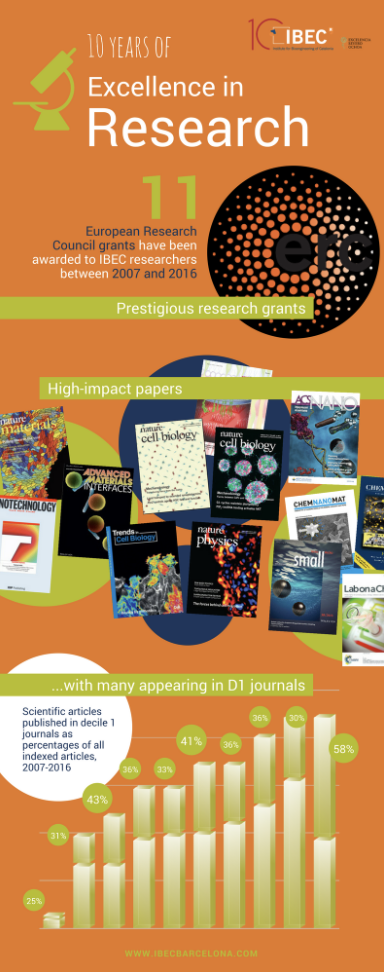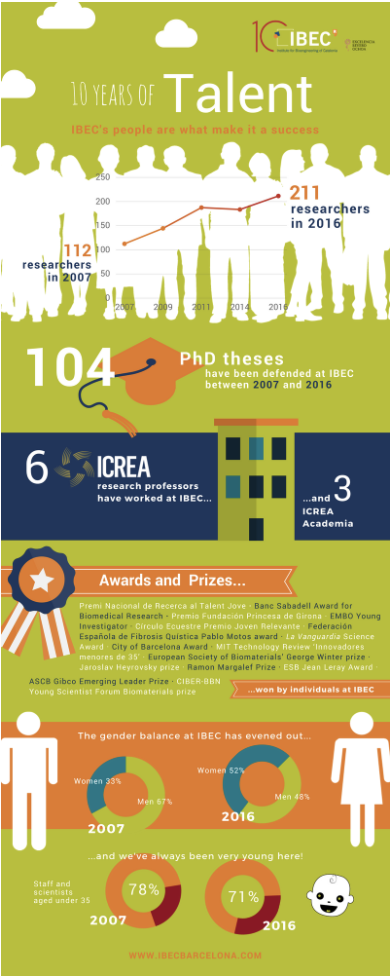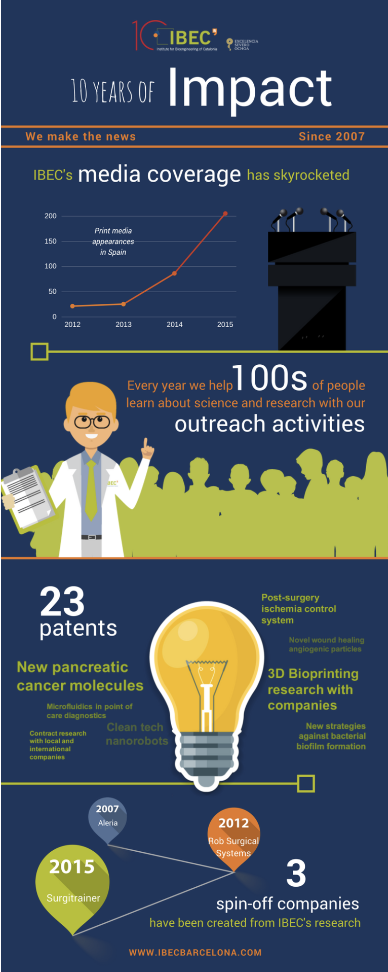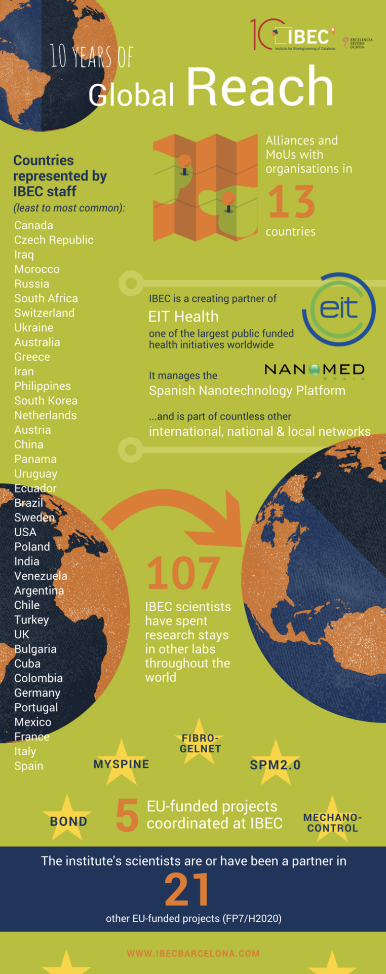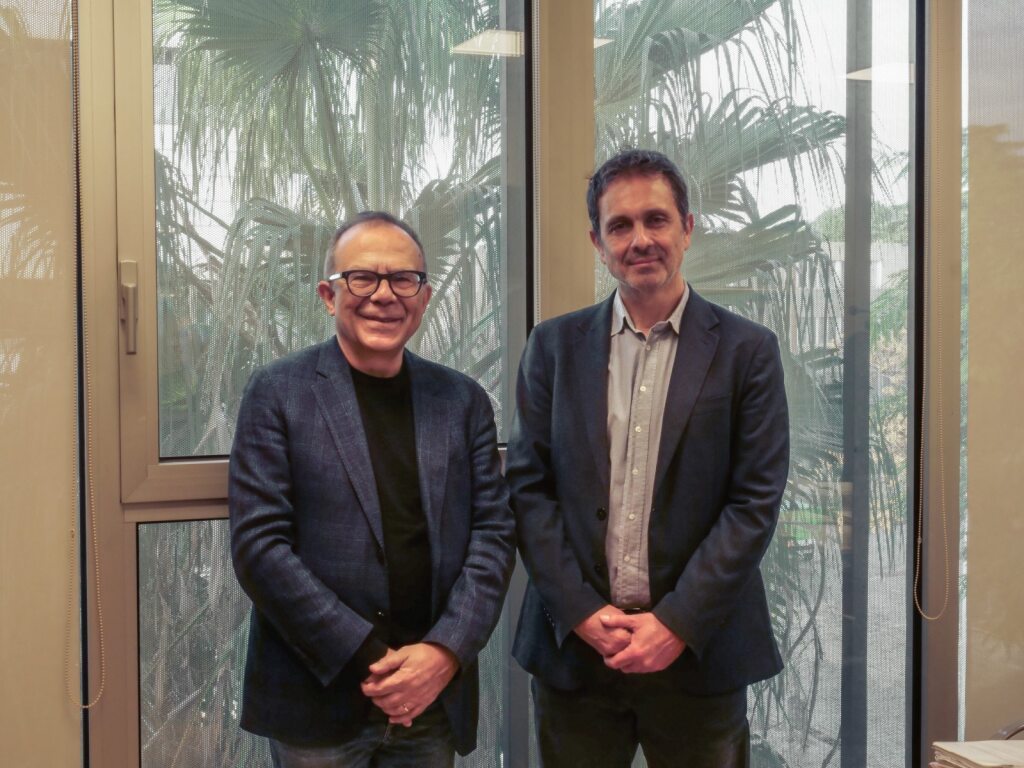
It is beyond all doubt that a society can only face the future and improve quality of life by generating new knowledge to develop new solutions or technological improvements to meet the major challenges we all face.
At IBEC, frontier research is combined with specific transfer targets to produce new applied technologies to be used in life and health sciences. We have the versatility to generate excellent research and, at the same time, work with industry to develop new diagnostic or treatment systems.
Early diagnosis, new therapies based on regenerative medicine, better quality of life compatible with an ageing population, and technological advances to increase efficiency and make healthcare sustainable: these are some excellent examples of areas where IBEC can contribute with its cutting-edge research to generate new technological advances of key importance to innovation. They are challenges which concern us because of their social and human repercussions, but also because they have a significant political and economic dimension.
IBEC has the capacity to write many success stories on healthcare technology, nanomedicine and advanced therapies, in the spheres of science, technology and innovation, success stories of which we will all be able to feel proud.
Manuel Salmeron, Acting Director, and Josep Samitier, Former Director
ABOUT US
The Institute for Bioengineering of Catalonia (IBEC) conducts excellent interdisciplinary research at the frontiers of engineering and life sciences in order to generate new knowledge by putting together fields like nanomedicine, biophysics, biotechnology, tissue engineering and the applications of health information technology.
IBEC was established in 2005 by the Ministries of Innovation, Universities and Enterprises and Health of the Generalitat de Catalunya (Autonomous Government of Catalonia), the University of Barcelona (UB) and the Technical University of Catalonia (UPC). Today, IBEC’s relationship with the UB and UPC researchers continues to operate under a framework agreement signed in 2008.
The institute currently has 23 research groups, 395 researchers and staff from 38 different countries. IBEC’s headquarters and most of its labs are located in the Parc Científic de Barcelona, which offers a highly stimulating biomedical environment in which the institute can work closely with organizations from the public and private sector interested in the biomedical application of nanotechnology. A few of IBEC’s labs are located at other sites, all of which provide the clinical, equipment or collaborative requirements specific to those groups.
IBEC is part of a new wave of research initiatives set up in the last decade, with shared interests and points of view concerning how to advance the frontiers of knowledge in experimental science to benefit clinical and biomedical research. The common denominator shared by these new initiatives is their focus on the enormous challenge of how to make life science quantitative on any scale, taking full advantage of the unprecedented power of the convergence between nano, bio and ICT.
HISTORY
IBEC arose from the Centre of Reference for Biomedical Engineering of Catalonia (CREBEC), established in 2003 to coordinate the multidisciplinary research activities in biomedical engineering carried out in Catalonia.
CREBEC was comprised of the Biomedical Engineering Research Centre (CREB) of the Technical University of Catalonia (UPC), the Research Centre on Bioelectronics and Nanobioscience (CBEN) of the University of Barcelona (UB) and the then newly created Laboratory of Nanobioengineering Research.

The first 10 years
FOUNDATION
IBEC was established in 2005 by the then Department of Innovation, Universities and Enterprises and the Department of Health of the Generalitat de Catalunya (Autonomous Government of Catalonia), the University of Barcelona (UB) and the Technical University of Catalonia (UPC).
 | University of Barcelona (UB) |
 | Technical University of Catalonia (UPC) |
 | Department of Health, Generalitat de Catalunya |
 | Ministry of Research and Universities, Generalitat de Catalunya |
BOARD OF TRUSTEES
The governing body of IBEC is its Board of Trustees, composed of members of the four founding institutions.
IBEC’s Board of Trustees receives advice from the director of the institute and from the Scientific Advisory Board.
| President | Hble. Sra. Olga Pané Mena | Consellera de Salut, Generalitat de Catalunya |
| First Vice president | Hble. Sra. Núria Montserrat Pulido | Consellera de Recerca i Universitats, Generalitat de Catalunya |
| Members | Excm. i Mgfc. Sr. Francesc Torres Torres | Rector, Universitat Politècnica de Catalunya |
| Excm. i Mgfc. Sr. Joan Guàrdia Olmos | Rector, Universitat de Barcelona (UB) | |
| Sra. Teresa Sanchis | Directora General de Recerca, Departament de Recerca i Universitats, Generalitat de Catalunya | |
| Sra. Laia Pellejà | Directora de la Fundació Institut dels Centres de Recerca de Catalunya (CERCA) | |
| Sr. Antoni Plasència i Taradach | Director General de Recerca i Innovació en Salut | |
| Sra. Montserrat Llavayol Giralt | Subdirectora General de Recerca i Innovació en Salut | |
| Sr. Pedro Díez Mejía | Vicerector de Recerca, Universitat Politècnica de Catalunya | |
| Sra. Maria Pau Ginebra Molins | Professora, Dept. Ciències dels Materials i Enginyeria Metal·lúrgica, UPC | |
| Sr. Jordi Garcia Fernández | Vicerector de Recerca, Universitat de Barcelona | |
| Sr. José Navarro Cid | Catedràtic d’Universitat i director del Dept. de Psicologia Social i Psicologia Quantitativa, UB | |
| Secretary | Sr. Josep Maria Alcoberro Pericay | Àrea jurídica, CERCA |
SCIENTFIC ADVISORY BOARD
IBEC’s Scientific Advisory Board plays a key role in the activities of the institute, focusing especially on the selection and evaluation processes of the research group leaders.
The committee is composed of international renowned scientists in different bioengineering fields, as well as prestigious professionals in key areas within the activities of IBEC, such as research results valorization or medical technologies validation.
| Samuel Stupp (President) | Director, Simpson Querrey Institute for BioNanotechnology, Northwestern University, Chicago (USA) |
| Carljin Bouten | Professor of cell-matrix interaction for cardiovascular regeneration, Department of Biomedical Engineering, Eindhoven University of Technology, Netherlands |
| Sergio Cerutti | Professor in Biomedical Signal and Data Processing, Department of Biomedical Engineering, Politecnico di Milano, Italy |
| Lim Chwee Teck | Provost’s Chair Professor, Deputy Head, Department of Biomedical Engineering, National University of Singapore |
| Roger Kamm | Cecil and Ida Green Distinguished Professor of Biological and Mechanical Engineering and former Associate Head of the Department of Mechanical Engineering at MIT |
| Luis de Lecea | Professor of Psychiatry and Behavioral Sciences Stanford University |
| Krishna Persaud | Professor of Chemoreception, School of Chemical Engineering and Analytical Science, University of Manchester |
| Bernat Soria | Director, Departamento de Células Troncales, Centro Andaluz de Biología Molecular (CABIMER) |
| Molly Stevens | Professor of Biomedical Materials and Regenerative Medicine and the Research Director for Biomedical Material Sciences in the Institute of Biomedical Engineering at Imperial College |
| Fiona M. Watt | Director of the European Molecular Biology Organization (EMBO) and group leader at EMBL Heidelberg |
Former members
- Heiko Zimmermann · Managing Head of the Fraunhofer Institute for Biomedical Engineering (Germany).
- Charles J. Dorman · Chair of Microbiology, Trinity College Dublin (Ireland).
- Jocelyne Troccaz · Dir. de Recherche, CNRS. Equipe GMCAO – Laboratoire TIMC-IMAG. Univ. Joseph Fourier-CNRS.
- Günter Fuhr · Director, Fraunhofer Institute for Biomedical Engineering (Germany).
- Prof. Jean Louis Coatrieux (fomer President) · Professor, Laboratoire de Traitement du Signal et de l’Image, INSERM, Université de Rennes (France).
- Prof. Luigi Ambrosio · Director, Institute for Composite and Biomedical Materials, University of Naples (Italy).
- Mr. Léonard Aucoin, M.Ps., M.P.H. · President, InfoVeille Santé Ltée (Canada).
- Prof. Paolo Dario · Coordinator, Center for the Research in Microengineering, University of Pisa (Italy).
- Prof. Jeffrey Fredberg · Professor of Bioengineering and Physiology, Harvard School of Public Health (USA).
- Prof. Bernt E. Uhlin · Director, The Laboratory for Molecular Infection Medicine Sweden (MIMS), The Swedish Node of the Nordic EMBL Partnership for Molecular Medicine, Umeå University (Sweden).


